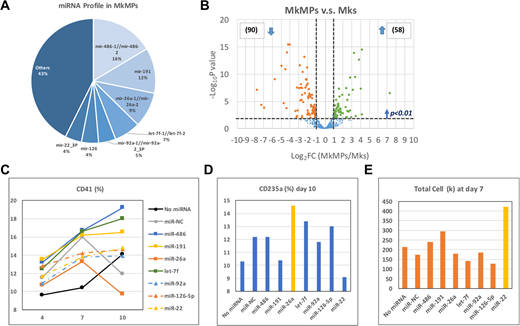Abstract
Introduction:
Cell-derived microparticles (MPs) are submicron-size extracellular vesicles (EVs), playing an important role in cell-to-cell communication via cargo delivery from source to target cells. Megakaryocytic microparticles (MkMPs) are the most abundant MPs in circulation (Flaumenhaft et al., 2009). MkMPs target and deliver cargo specifically to hematopoietic stem & progenitor cells (HSPCs) through receptor-mediated fusion or endocytosis (Jiang et al., 2017), thus inducing HSPC megakaryocytic differentiation in the absence of thrombopoietin (TPO) (Jiang et al., 2014). Transfer of MkMP RNA to HSPCs is largely responsible for the observed effects (Jiang et al., 2017). Given that all MPs are highly enriched in miRNAs, we hypothesized that MkMP miRNAs mediate HSPC megakaryocytic differentiation in the absence of TPO. Thus, we used RNAseq to identify the miRNA content of MkMPs (as well as the miRNA content of control Mk cells, platelets and platelet MPs (PMPs)), and examined which MkMP miRNAs might promote HSPC megakaryocytic differentiation in the absence of TPO.
Methods:
Human MkMPs were isolated and purified from CD34+-derived Mk cells (Jiang et al., 2014). Total RNA from Mks, MkMPs, platelets and PMPs were extracted and small RNAs were selected for library preparation. RNAseq was performed using Ilumina HiSeq. Differential miRNA expression was analyzed via the EdgeR Bioconductor. To examine the impact of the seven most abundance miRNAs on Mk differentiation of HSPCs, individual, or combinations of, miRNA mimics were transfected into CD34+ HSPCs and cultured in the absence of TPO. Cells were analyzed by flow cytometry (FC) for CD41 (Mk marker), CD235a (erythroid marker) expression and total cell count at days 4, 7 and 10. To further examine the impact of these miRNAs, miRNA inhibitors corresponding to these seven miRNAs were loaded into MkMPs via electroporation. miRNA-inhibitor-loaded MkMPs were co-culture with CD34+ HSPCs, and CD41, CD235a, and CD42b (a late Mk marker) were analyzed by FC at days 3, 5, and 8.
Results:
miRNA sequencing and differential expression analysis showed that the top seven most abundant miRNAs (Fig. 1A) account for more than 57% of miRNAs in MkMPs, with 58 miRNAs being enriched in MkMPs from Mks (Fig. 1B). Similarly for differential expression vs platelet or PMP miRNAs. We hypothesized that a combination of these seven miRNAs mediates Mk differentiation of HSPCs. To test this hypothesis, miRNA mimics were transfected individually or in combinations into CD34+ HSPCs. Individual miRNA transfection showed that miR-486-5p, miR-191-5p, and let-7f-5p promote Mk differentiation by enhancing CD41 expression on days 7 & 10 (Fig. 1C), while miR-26a-5p enhanced erythropoiesis (higher CD235a expression) and suppressed megakaryopoiesis (lower CD41 expression) late in culture (Figs. 1C & 1D). While miR-22-3p promoted cell expansion (Fig. 1E), no effect on Mk differentiation was found. Transfection of multiple miRNAs demonstrated the positive role of miR-486-5p and miR-92a-3p in promoting Mk differentiation, and the importance of miR-486-5p, miR-26a-5p, miR-92a-3p, and miR-126-5p in early HSPC expansion. Furthermore, inhibition of miR-486-5p in MkMPs abolished the impact of MkMPs on programing Mk differentiation of CD34+ HSPCs by lowering CD41 expression after 8 days of co-culture.
Conclusions:
This is the first report of the MkMP miRNA profile. We identified seven major MkMP miRNAs mediating cell expansion and Mk differentiation of HSPCs in the absence of TPO, thus suggesting that suitable miRNA combinations can mimic TPO signaling. The latter is the focus of on-going studies in our lab by examining the impact of these miRNAs on TPO-induced signaling pathways: Jak/STAT, PI3K/Akt and MAPK. Our study elucidates the biological effect of MkMPs to HSPCs, and demonstrates the importance of combinatorial vs single miRNA studies.
No relevant conflicts of interest to declare.
Author notes
Asterisk with author names denotes non-ASH members.


This feature is available to Subscribers Only
Sign In or Create an Account Close Modal